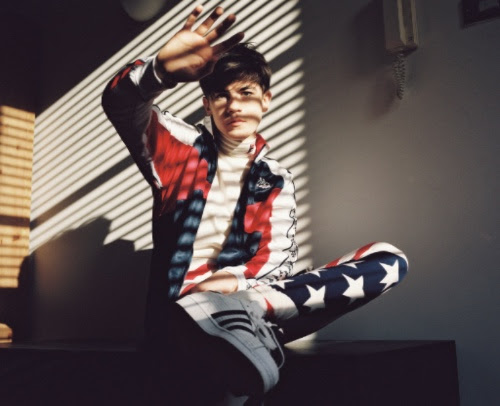
Declan McKenna releases his debut album ‘What Do You Think About The Car?’ on the 21st July 2017 through Columbia Records.
The record was recorded in London and LA alongside producer James Ford, except Listen To Your Friends, which was produced by Rostam Batmanglij, Paracetamol, produced by Neil Comber, and Brazil, produced by Max Marlow.
To coincide with the album’s announcement, Brazil, the track that kick-started Declan’s career at the age of fifteen, is announced as his new single and launches with a Taz Tron Delix directed video.
British musician Declan McKenna is a pertinent example of why the future might not be quite so bleak after all. That isn’t specifically ‘our’ future per se, for that, sadly, remains under a heavy raincloud, but for a new generation light bulbs are switching on, emphatically. Green shoots, fresh interpretations, young minds that won’t/can’t sit back and suck it all up. These guys are apparently smarter than that. They’ve got notions of their own, questions to be answered, and maybe even some answers to questions. Answers. Imagine. No pressure.
Global politics and millennial futures aside for the moment, and eighteen-year-old Declan McKenna is becoming a comparatively wisened hand at this music industry game. A solitary track he posted to Bandcamp at the age of fifteen brought with it all the attention that the industry could at once foist. Legend has it that young Declan would finish school mid-afternoon in Hertfordshire, and schlep up to Liverpool Street on the train whilst still in his school uniform to meet with dozens of artist managers to determine who he could trust, and who could look beyond that track and gauge the bigger picture. Whilst that circus was in play, he was selected by Michael Eavis to perform at Glastonbury Unsigned, (the acceptable face of Battle of the Bands, if you squint a bit), winning said battle by a landslide, and performing twice at the Glastonbury Festival that same Summer. Tick.
The song in question was called Brazil. It called out the heads of FIFA (topical of the time), and focused on the body’s innate corruption. That rolling stone continued to gather its moss, and if you search “Declan McKenna Brazil Sky News” on YouTube, you’ll find a bemused sixteen year old Declan discussing the song under the heat of Sky’s studio lights. He wears a big grin on his face for the most part. Not over-awed. He wrote a great song, and he’ll talk about it. Simple.
Inevitably a record deal soon arrived, and Declan started to piece together a live band (and what a band they’ve since become). He had a clutch of songs in various states of undress, one of which,Paracetamol, immediately stood out. Alongside the colourful Casio squiggles and a melody-heavy chorus, was a story being told inspired by the tragic case of Leelah Alcorn, a transgender teenager in the US who committed suicide and posted her reasons for doing so on Tumblr. From the perspective of the media, Declan wrote Paracetamol to address the misunderstood reporting of transgender teens that regularly minimise the characters to their trauma alone. He explained it all in greater detail in a blog for The Guardian and the song’s eventual video provides a telling, crucial narrative to the song.
The introductory singles that followed kept true to Declan’s USP, each with their own socially aware story to tell. Bethlehem, for example, was written about religion being used to justify hate crime, and the instant, infectious Isombard focused on a US newsreader’s misinterpretation of the story he is trying to tell – as the propaganda rolls, said newsreader gets more and more confused by what he’s trying to say. It’s inspired by a poem by E. E Cummings, and is a fascinatingly complex narrative. Complex narratives are almost integral to what Declan does.
